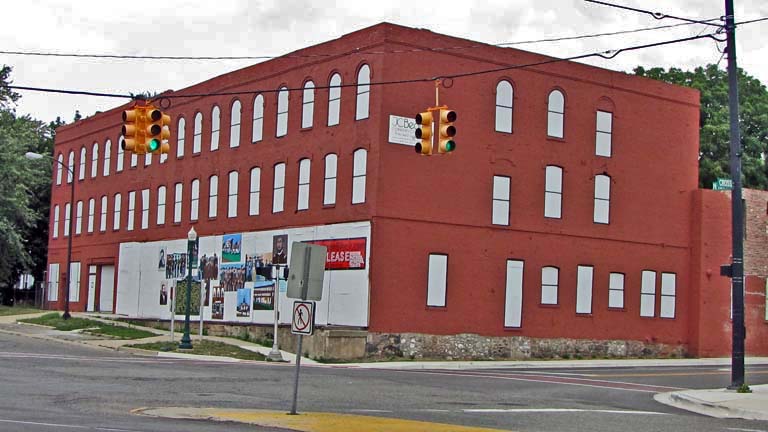

The structure you see pictured here was built about 1860 or a little earlier and then was known as the Norris Block. Mark Norris was one of the founders of Ypsilanti, arriving, I believe, shortly after the Central Railroad of Michigan began service to Detroit in 1838. The railroad erected a frame depot on the site of the present Michigan Central freight station. Norris built a brick hotel—The Great Western Hotel—on the north side of the tracks at the site of the present Michigan Central depot, opening it in 1839. The railroad, in the late 1850s, desired to build an impressive station there so they bought the land. Mr. Norris reused the bricks from his Great Western hotel to construct the Norris Block. Presumably, investors were impressed by the growth of Ypsilanti as a manufacturing center and this site which was less than 100 yards from the Michigan Central depot was ideal. This is a three-story Italianate structure designed for retail trade at the lower level and residents above.
The South Carolina militia fired upon Fort Sumpter on April 12, 1861, initiating the Civil War. Very quickly, men—and a few women—volunteered to serve. A local militia group, the Ypsilanti Light Guard, was organized in the spring of 1861. Apparently, the military, at this time, took over the Norris Block to serve as a marshaling point for troops who would be sent by train to the battle zones. The Ypsilanti Light Guard became Company H of the First Michigan Infantry and arrived in Washington by train on May 16, 1861. Throughout the Civil War, the Norris Block was used to house soldiers who, I assumed, arrived from points west in Michigan and then were organized into units to be sent to battlefields. Another unit, the Fourteenth Michigan Infantry, spent the winter of 1861-1862 in the Norris Block building and then were dispatched to Mississippi. Later in the war, I believe that the Norris Block building was expanded with construction of space for a military hospital.
Oliver E. Thompson purchased the building in 1869, giving it the name it bears today. It was used for a variety of commercial purposes over the years. Thompson and his sons sold a great variety of products from this building: paint, wagons, bicycles, agricultural implements and hardware. One of Thompson’s grandsons opened a Dodge dealership in the building but later moved it across the street to the building that now houses the last surviving Hudson dealer. The final descendent of the Thompson family sold their interest in the structure in 1950. I think an Ypsilanti historian might claim that the Thompson Block served as the first fire station in the city, the first hardware store, the first bicycle shop and the first auto dealership. Since 1950, it has been idle for some periods of time and used at other times.
In 2009, a fire gutted the Thompson Block. Since there was a danger that major pieces would fall, the city insisted that scaffolding be put up to protect those who passed by. In 2010, the city of Ypsilanti entered into an agreement with the owner, Steven Beal, about repair of the building. Apparently, that entrepreneur was unable to locate funds to renovate the structure, no surprise given the state of the nation’s economy. In 2014, the Ypsilanti city council considered approving a $530,000 tax abatement for Mr. Beal if he would repair the building. At that time, Mr. Beal estimated the cost of renovation at about $5.8 milllion. His website describes a conversion of the structure to provide 16 lofts and 14,000 square feet of retail space.
Subsequently, the local press published unconfirmed reports that Zingerman’s Delicatessen and Expresso Royale had signed letters of intent to rent space. I have not read anything recently about the status of the building. Typically, it takes developers years to assemble the requisite tax credits and loans needed to refurbish an old building. If computer rail returns to Ypsilanti with a stop in Depot Town, you can imagine some considerable growth of residential and commercial activity within walking distance of the train station. It makes sense to think that Zingerman’s and Expresso Royale would want to market their products to those traveling on the trains. The efforts of Dan Gilbert to turn downtown Detroit into a center for the information technology linked to manufacturing have already changed the housing market there as developers convert old buildings to residential and erect new one. If housing is in short supply in downtown Detroit and if the new Regional Transit Authority establishes a commuter rail system rivaling those of other cities, you could image that the owner of the Thompson block would want to sell the property to a developer who would build a large condominium structure there.
Date of Construction: About 1860
Architect: Unknown to me
Use in 2015: Abandoned building awaiting reuse
Website for the developer: http://thompsonblock.com/
Michigan Registry of Historic Sites: Listed Summer, 2012
Michigan Historic Marker: Installed in June, 2012
National Register of Historic Places: Not listed
Photographs: Ren Farley; July, 2012
Description prepared: April, 2015
Return to Military Detroit
Return to Commercial Buildings
Return to Homepage